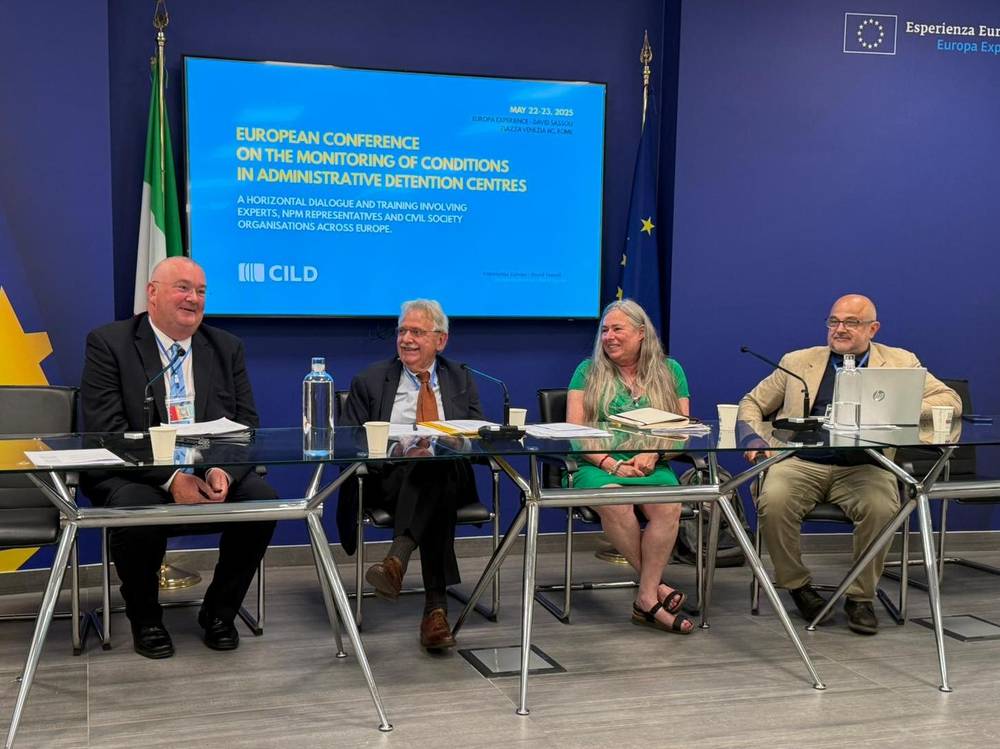A European conference on monitoring conditions in administrative detention centres for migrants was held in Rome on 22 and 23 May 2025. It was organised by the Italian organisation CILD (Coalition for Civil Liberties and Rights), which has been implementing the 'Black Holes' campaign to expose human rights violations in administrative detention centres since 2021. The aim of the meeting was to strengthen the capacity to monitor conditions in these centres, which, due to their administrative nature, require particular attention and sensitivity. The event, which took place at the Europa Experience – David Sassoli premises in the centre of Rome, was attended by representatives of several national preventive mechanisms (NPMs), civil society, academics, and experts in the fields of medicine, psychiatry, and human rights. Ivan Šelih, Deputy Ombudsman and Head of the Slovenian National Preventive Mechanism (NPM), presented the practice and challenges of the Slovenian model of monitoring migrant detention.
The event took place in the light of current political developments, including the agreement between Italy and Albania on the treatment of migrants and the upcoming entry into force of the new Pact on Asylum and Migration, which foresees the expansion of the administrative detention system. In this context, participants highlighted the need to strengthen the capacity to monitor administrative detention, which poses a particular challenge due to its legal nature and often lacking human rights safeguards.
Deputy Ombudsman Ivan Šelih presented the organisation and operation of the Slovenian NPM as part of a panel intended to exchange experiences between NPMs from different countries. He emphasised that since 2015, the Slovenian NPM has been organised as an independent unit within the institution of the Human Rights Ombudsman of the Republic of Slovenia and carries out visits, prepares reports, and makes recommendations for improving conditions in institutions where deprivation of liberty occurs. A key element is cooperation (currently) with nine selected non-governmental organisations, which allows for a broader professional perspective and greater independence of supervision. In 2024, the NPM carried out as many as 72 visits, including visits to institutions where migrants are accommodated, and prepared a report with findings and recommendations for each visit, he said.
In his presentation, Šelih described in detail several key areas: from visits to police stations, where the NPM specifically monitors the treatment of foreigners, to living conditions in the Asylum Centre, the Centre for Foreigners and the new Centre for Unaccompanied Minors. He drew attention to problems such as overcrowding, lengthy asylum proceedings, lack of alternatives to detention, the need for psychosocial support, and sometimes inadequate treatment of vulnerable groups such as women, minors, and people with mental health problems. He also stressed the importance of systematically providing interpretation, access to legal aid, and respecting the dignity and privacy of detained persons. He particularly highlighted the successes in implementing the Ombudsman's recommendations in practice, including the establishment of a dedicated centre for unaccompanied minors and two decisions of the Constitutional Court that repealed unconstitutional provisions of the Foreigners Act.
The conference programme also included contributions from experts from the Committee for the Prevention of Torture (CPT) of the Council of Europe, researchers from the University of Oxford, representatives of the Italian organisation Antigone, doctors, and lawyers. Representatives of the CPT from Albania, Bosnia and Herzegovina, Catalonia, Greece, Italy, Portugal, and Slovenia, as well as representatives of civil society organisations from across Europe, participated in the discussions. They discussed in more detail the methodology of supervision, the exchange of good practices, alternative measures to detention, the use of solitary confinement, and the role of healthcare in these settings.
The conference confirmed the participants' shared commitment to independent and effective oversight of institutions where persons are detained and to improving standards of conduct in accordance with international human rights law. It also strengthened networking between NPMs and civil society and reinforced the importance of the Slovenian Ombudsman's role as an active defender of human rights, including in the European space.

![[Translate to English:] Namestnik varuha Šelih med kolegi iz DPM-jev na konferenci](/fileadmin/_processed_/f/5/csm_Selih_na_konferenci_v_Rimu_cfa2ab31ba.jpg)